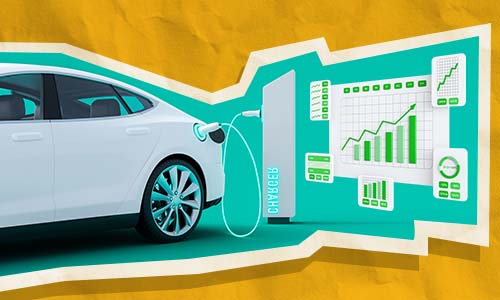UK car market statistics: Used and new car sales data Q1 2025
Published July 02, 2025
- 2,020,990 used cars changed hands in Q1 2025, marking the first quarter where used sales surpassed 2 million since before the pandemic.
- Used sales increased by 2.7% YoY, with the sector enjoying a ninth consecutive quarter of growth.
- New car market sales fell by 10.4% in April, marking the sixth decline in seven months.
Whether you’re a journalist, consumer, or automotive professional, understanding the latest market trends will help you make informed decisions.
Our updated car market guide rounds up the latest sales data, statistics, and insights from across the UK’s new and used car markets. We’ve added expert commentary and forecasts to help you interpret the crucial details.
We’ll brief you on the key developments from Q1 2025, including the best-selling car models, market share by powertrain, and the challenges that lie ahead for automakers and retailers.
Get a free valuation
Car market glossary
YoY = Year-on-year
Powertrain = The system responsible generating a vehicle’s power - and transferring it to the road.
EV = Electric vehicle
BEV = Battery electric vehicle
PHEV = Plug-in hybrid electric vehicle
MHEV = Mild hybrid electric vehicle
ICE = Internal combustion engine
SMMT = Society of Motor Manufacturers and Traders
Used car market highlights from Q1 2025
| Q1 2025 | Q1 2024 | % change YoY | |
|---|---|---|---|
| Used car transactions | 2,020,990 | 1,967,923 | +2.7% |
| Jan | Feb | March | Total (Jan-Mar) | |
|---|---|---|---|---|
| 2024 | 650,747 | 653,484 | 663,281 | 1,967,923 |
| 2025 | 659,682 | 651,783 | 709,525 | 2,020,990 |
Source: SMMT
- BEVs recorded 58.5% YoY growth, with 65,850 units sold, and a record 3.3% market share.
- Petrol remained the best-selling powertrain, rising 2.1% YoY, with 1,149,855 units sold, while diesel sales fell 3.1% to 679,739 units.
- ICE cars accounted for 90.5% of used transactions, but combined petrol and diesel market share fell by 2.4% YoY.
- HEVs saw record numbers of second and third owners, with sales rising by 30.2% to 98,830 units.
- Meanwhile, 23,540 PHEVs were resold, marking a 14% YoY increase.
- Cap HPI data showed that in February, the average time taken to sell a 3-5-year-old BEV decreased to just 35 days, outperforming petrol and diesel vehicles, which took 42 and 46 days respectively.
- A study examining second-hand vehicle listings from the UK’s 30 leading manufacturers showed that on average, used ICE models cost £2,560 more than equivalent BEVs of the same age, brand, and mileage.
Source: SMMT, cap hpi, Car Gurus
Used car market commentary
webuyanycar’s head of technical services, Richard Evans, said:
“The used car market is showing clear signs of electrification momentum, as the benefits of a wider choice of EVs and price cuts on new models are starting to reach second-hand showrooms.
“As many used EVs are now cheaper than equivalent ICE models, the case for making the switch to electric is more compelling than ever, especially considering the lower running costs and the UK’s ever-growing public charger network.
“Stronger sales for used cars compared to new can be linked to new car price inflation. The rising cost of new cars and everyday living expenses has led many buyers to seek affordable alternatives within the used car market.”
Used car market predictions for 2025 and beyond
- Cox Automotive's Forecast states that used car sales will stabilise in 2025 – with 7,643,043 sales predicted.
- The automotive software provider also predicts that electrified vehicles’ share of the car parc will grow significantly by 2028.
- The share of HEVs and PHEVs is projected to increase by 87% - and BEVs by 177%.
- Petrol cars are expected to see a 5.97% decline over the same period.
Source: Cox Automotive

New car market statistics Jan-April 2025
| Powertrain | April 2025 | April 2024 | % change | Market share '25 | Market share '24 |
|---|---|---|---|---|---|
| BEV | 24,558 | 22,717 | +8.1% | 20.4% | 16.9% |
| PHEV | 14,073 | 10,493 | +34.1% | 11.7% | 7.8% |
| HEV | 16,586 | 17,081 | -2.9% | 13.8% | 12.7% |
| Petrol | 58,733 | 75,334 | -22.0% | 48.8% | 56.1% |
| Diesel | 6,381 | 8,649 | -26.2% | 5.3% | 6.4% |
| Total | 120,331 | 134,274 | -10.4% |
Source: SMMT
- BEV sales grew 8.1% YoY to secure a 20.4% market share, while PHEV sales rose 34.1% YoY to secure an 11.4% market share.
- Although the number of HEV sales fell -2.9% YoY, overall market share grew by 1.1%.
- Both petrol and diesel cars saw significant drops in market share: -22% and -26% respectively.
| Powertrain | Jan – Apr 2025 | Jan-Apr 2024 | % change | Market share '25 | Market share '24 |
|---|---|---|---|---|---|
| BEV | 144,749 | 107,031 | +35.2% | 20.7% | 15.7% |
| PHEV | 67,759 | 53,052 | +27.7% | 9.7% | 7.8% |
| HEV | 102,591 | 89,552 | +14.6% | 14.6% | 13.2% |
| Petrol | 345,520 | 383,883 | -10.0% | 49.3% | 56.5% |
| Diesel | 40,214 | 46,304 | -13.2% | 5.7% | 6.8% |
| Total | 700,833 | 679,822 | +3.1% |
A growing divide between fleet and private sales
| Jan-Apr 2025 | Jan-Apr 2024 | % change | Market share ‘25 | Market share ‘25 | |
|---|---|---|---|---|---|
| Private | 274,076 | 257,804 | +6.3% | 39.1% | 37.9% |
| Fleet | 412,676 | 407,666 | +1.2% | 58.9% | 60.0% |
| Business | 14,081 | 14,352 | -1.9% | 2.0% | 2.1% |
| Total | 700,833 | 679,822 | -3.1% |
Source: SMMT
- New car registrations fell across the private, fleet, and business sectors by 7.9%, 11.9% and 10.9% respectively between January and April 2025.
- However, fleet purchases have continued to drive market activity, accounting for six in 10 registrations.
New car market commentary
webuyanycar’s head of technical services, Richard Evans, said:
“The latest data demonstrates a continued shift towards electrification for the new market. Electrified vehicles are gaining market share, even as overall new car sales decline.
“With at least 132 EV models on the UK market, accounting for a third of all new cars available, electric motoring is becoming mainstream. It’s also more affordable, thanks to the arrival of new budget EVs such the sub-£15k Dacia Spring.
“Petrol’s market share has symbolically slipped below 50%, whilst diesel’s presence continues to erode, indicating a slow but steady change in buyer preferences.
“The overall drop in registrations indicates that fewer consumers are considering brand-new cars. New car prices have increased around 40% in the last decade while consumer spending power has fallen.
“Conversely, increases in used car prices have been much more modest – rising just 7% over the same period. So, many budget-conscious consumers are buying used. Fleet sales have remained stronger by comparison thanks to the various perks, incentives and rebates that are not available to private buyers.”
New car market predictions for 2025
The SMMT’s April 2025 outlook included the following key predictions:
- New car registrations will rise 0.6% to 1.96 million – a slight downgrade from January’s forecast of 1.953 million.
- BEV registrations will rise to 21%, pushing market share to 23.5% (down from 23.7% in January).
- PHEV registrations will rise by 17.8% to achieve a 10% market share.
- HEV market share will reach 15%, following a 12.4% rise in volumes.
- Diesel market share will fall to 5.3% after a 15.6% drop in volumes.
- Petrol volumes will fall 10.9%, reducing market share to 46.2%.
- New car registrations are predicted to rise 1.4% to 1.99 million (from up from 2025’s SMMT forecast figure of 1.96 million).
Tariffs, trade deals, and the UK car markets
- Automotive industry insiders are examining the potential effects of new US vehicle import tariffs on the UK’s new and used car markets.
- In May 2025, the US and the UK reached a trade deal reducing US vehicle import tariffs from the UK from the original 25% levy to a maximum 10% (with an annual cap of 100,000 vehicles.
- The new deal provides some relief for automakers, but puts a ceiling on exports, as any vehicles exported to the US beyond the 100,000 threshold will be tariffed at a rate of 27.5% (25% plus a 2.5% base tariff).
- If UK automakers cut production due to lower US sales, this could reduce the number of cars reaching showrooms.
- Insiders believe the reduced supply could drive up new prices, pushing more consumers towards the used market, causing used prices to rise.
How many cars are there in the UK?
According to DVLA data, as of December 2024 there were approximately 33,970,000 UK-registered cars.
UK used car sales statistics (2025-2014)
| Year | Number of used car sales |
|---|---|
| 2025 | 7,643,043 (Cox Automotive projection) |
| 2024 | 7,643,180 |
| 2023 | 7,242,692 |
| 2022 | 6,890,777 |
| 2021 | 7,530,956 |
| 2020 | 6,752,959 |
| 2019 | 7,935,105 |
| 2018 | 7,945,040 |
| 2017 | 8,113,020 |
| 2016 | 8,200,000 |
| 2015 | 7,640,015 |
| 2014 | 7,433,129 |
Source: SMMT
UK used car sales by powertrain (2023-2024)
| Powertrain type | 2024 | 2023 | YoY % change |
|---|---|---|---|
| Petrol | 4,367,009 | 4,079,555 | +7.05% |
| Diesel | 2,674,725 | 2,747,911 | -2.66% |
| HEV | 306,114 | 221,859 | +37.98% |
| BEV | 118,382 | 118,973 | -0.50% |
| PHEV | 92,120 | 65,837 | +39.92% |
Source: SMMT
Best selling used car models (2023-2025)
| 2025 transactions (Jan-Apr) | 2024 transactions | 2023 transactions |
|---|---|---|
| Ford Puma (18,241) | Ford Puma (48,340) | Ford Puma (49,591) |
| Kia Sportage (16,380) | Kia Sportage (47,163) | Nissan Qashqai (43,321) |
| Nissan Qashqai (13,989) | Nissan Qashqai (34,454) | Vauxhall Corsa (40,816) |
| Vauxhall Corsa (13,852) | Nissan Juke (34,454) | Kia Sportage (36,135) |
| Nissan Juke (12,373) | Tesla Model Y (32,862) | Tesla Model Y (35,899) |
| Volkswagen Golf (12,348) | Volkswagen Golf (32,370) | Hyundai Tucson (34,469) |
| MG HS (11,016) | Hyundai Tucson (32,174) | MINI (33,385) |
| Volkswagen Tiguan (10,664) | MG HS (30,207) | Nissan Juke (31,745) |
| Volvo XC40 (10,612) | Volvo XC 40 (30,207) | Audi A3 (30,159) |
| Hyundai Tucson (8,715) | Volkswagen Polo (28,981) | Vauxhall Mokka (29,984) |
webuyanycar’s head of technical services, Richard Evans said:
“The Ford Puma has continued its reign throughout 2023, 2024 – and even into early 2025. Many of the best-selling new models feature MHEV, HEV, and PHEV powertrains, signalling buyers’ appetite for cost-efficient motoring.
“Meanwhile, Tesla’s Model Y has placed in the top 10 best-sellers every year since 2021, but fell short in April 2025 following a quieter sales month. This means there are no pure electric cars in the current top 10.
“However, a wider selection of new all-electric offerings, including more affordable options, should help to continue new BEV sales growth this year and beyond.”
UK new car sales statistics (2025-2011)
| Year | Number of Registrations |
|---|---|
| 2025 | 1,964,000 (SMMT projection) |
| 2024 | 1,952,778 |
| 2023 | 1,903,054 |
| 2022 | 1,614,063 |
| 2021 | 1,647,181 |
| 2020 | 1,632,064 |
| 2019 | 2,311,140 |
| 2018 | 2,367,147 |
| 2017 | 2,540,617 |
| 2016 | 2,692,786 |
| 2015 | 2,633,503 |
| 2014 | 2,476,435 |
| 2013 | 2,264,737 |
| 2012 | 2,044,609 |
| 2011 | 1,941,253 |
Source: SMMT











